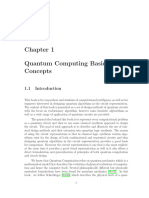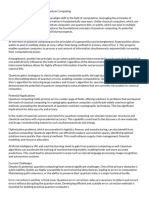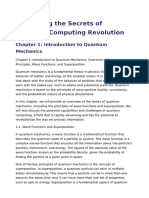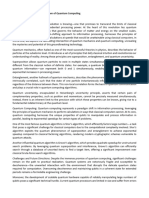Introduction To Quantum Computing
Uploaded by
godxhunter001Introduction To Quantum Computing
Uploaded by
godxhunter001Introduction to Quantum Computing
Introduction to Quantum Computing
--------------------
Quantum computing represents a revolutionary approach to computation, leveraging the
principles of quantum mechanics.
Traditional computers use bits as the basic unit of information, which can be either 0 or 1.
Quantum computers use quantum bits, or qubits, which can be in multiple states
simultaneously.
This property, known as superposition, along with entanglement and quantum interference,
enables quantum computers to solve certain problems much faster than classical
computers.
Quantum computing has the potential to transform fields such as cryptography, material
science, and complex system simulation.
One of the key challenges in quantum computing is maintaining the stability of qubits, as
they are highly susceptible to environmental disturbances.
Quantum algorithms, like Shor's algorithm for factoring large numbers, demonstrate the
potential power of quantum computing.
Companies and research institutions are actively developing quantum computers, with
significant advancements in recent years.
The race to achieve 'quantum supremacy'—where a quantum computer can outperform a
classical computer on a specific task—is a major focus in the field.
Despite its promise, quantum computing is still in its early stages, and practical, widespread
applications are likely years away.
The future of quantum computing is exciting, offering possibilities that could reshape the
landscape of technology and computation.
You might also like
- Unraveling The Enigmatic Mysteries of Quantum ComputingNo ratings yetUnraveling The Enigmatic Mysteries of Quantum Computing2 pages
- Slidesgo Unlocking the Future an Introduction to Quantum Computing 20240926130125eE1PNo ratings yetSlidesgo Unlocking the Future an Introduction to Quantum Computing 20240926130125eE1P12 pages
- Unveiling The Future of Computation With QuantumNo ratings yetUnveiling The Future of Computation With Quantum5 pages
- Lukac Perkowski Book Introduction and Quantum MechanicsNo ratings yetLukac Perkowski Book Introduction and Quantum Mechanics104 pages
- Chapter 1 Quantum Computing Basics and ConceptsNo ratings yetChapter 1 Quantum Computing Basics and Concepts104 pages
- Quantum_Computing_in_Electrical_Engineering_ExpandedNo ratings yetQuantum_Computing_in_Electrical_Engineering_Expanded11 pages
- Detailed Quantum Computing Report No ImagesNo ratings yetDetailed Quantum Computing Report No Images4 pages
- Quantum Computing For Memory Optimization and Hardware Size Reduction Cochin University of Science & TechnologyNo ratings yetQuantum Computing For Memory Optimization and Hardware Size Reduction Cochin University of Science & Technology1 page
- The Rise of Quantum Computing - Understanding the Next Tech RevolutionFrom EverandThe Rise of Quantum Computing - Understanding the Next Tech RevolutionNo ratings yet
- Unraveling The Secrets of Quantum Computing RevolutionNo ratings yetUnraveling The Secrets of Quantum Computing Revolution32 pages
- The Enigmatic World of Quantum ComputingNo ratings yetThe Enigmatic World of Quantum Computing1 page
- Quantum Mechanics and The Dawn of Quantum ComputingNo ratings yetQuantum Mechanics and The Dawn of Quantum Computing2 pages
- Wepik Quantum Computing Unleashing The Power of Information Processing 20240214155845SimNNo ratings yetWepik Quantum Computing Unleashing The Power of Information Processing 20240214155845SimN19 pages



























































